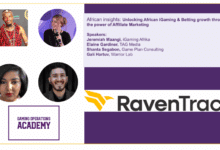Affiliates, Brands, and Loyalty: Mangoshi’s Approach to Building Sustainable Relationships

In the fast-paced world of affiliate marketing, maintaining trust and loyalty is key to long-term success. In this exclusive iGaming AFRIKA interview, Comex Mangoshi, Affiliate Manager at Megapari, shares insights on how Megapari fosters sustainable relationships with affiliates by encouraging loyalty to a single brand. Comex explains how this approach minimises confusion for players, strengthens affiliate credibility, and ultimately builds trust. From tackling the challenges of fixed fees in emerging markets to highlighting the advantages of revenue-sharing, he reveals the strategic nuances Megapari uses to balance affiliate and brand goals for mutual growth.
iGaming AFRIKA: So, as an affiliate manager, how do you handle the situation where an affiliate partner might want to work with multiple brands? Is there flexibility for affiliates to partner with different companies, or are there restrictions in place?
Comex: In our affiliate program, we have clear restrictions when it comes to partners working with multiple brands simultaneously. We don’t allow affiliates to represent more than one brand at the same time under our banner. This restriction is necessary because it avoids confusion among customers. For example, if an affiliate, let’s say, Jeremiah, is promoting one brand today and suddenly shifts to another brand tomorrow, players will notice. They might start questioning the integrity of the affiliate. They’ll wonder why Jeremiah made the switch. Is it because the first brand failed to meet his expectations, or did he leave because of an issue with payments or conditions? It raises doubts, especially when the brands have similar offerings—same odds, same bonuses—but the affiliate has moved to a new company.
From a customer’s perspective, this leads to trust issues. A player might think, “If Jeremiah left, does that mean this brand isn’t reliable? Should I be worried about the company’s financial stability?” This results in uncertainty, and sometimes, players will go as far as registering without using the affiliate’s promo code, thinking something shady is going on. The confusion can negatively impact both the affiliate’s performance and the brand’s credibility.
As an affiliate manager, it’s not acceptable for me to poach or encourage partners to leave one brand for another. The affiliate must make that decision independently. We need to maintain trust across the board, both with our partners and the players. If affiliates are constantly switching between brands, it dilutes their influence and can even reduce player engagement. Affiliates need to remain consistent in their promotions to build a reliable and trusted relationship with their audience.
iGaming AFRIKA: I understand that some countries struggle with affiliate partners who demand fixed fees instead of working on a revenue share or CPA model. How do you address this issue, especially in markets where affiliates are resistant to alternative payment structures? Also, how can education play a role in shifting their mindset, particularly as we see more influencers coming into the space?
Comex: That’s an insightful question, and it’s something we deal with quite a bit. I’ll give you an example from Zambia, where big affiliates are already locked into agreements with other brands, and they typically expect fixed payments. So, what do I do in this situation? I don’t just sit back; I go out into the field. I actively look for new talent—people who may not yet be famous affiliates but have a substantial social media following, anywhere between 5,000 to 10,000 followers.
Once I identify them, the key is to educate them. I train them for about a week, explaining the benefits of becoming an affiliate and, more importantly, why we prefer models like revenue share over fixed payments. A lot of the time, these new affiliates don’t fully understand the difference, and they might think working on a revenue share is less secure than getting a guaranteed fixed fee. So, it’s my job to explain the long-term benefits of revenue share.
One of the things I do is offer them an incentive with a clear deadline. For example, I might say, “Here’s a set amount of money, but if you don’t generate returns in two weeks, the money goes back to the company.” This creates a sense of urgency and responsibility.
During the training, I also teach them why fixed payments can be more stressful than revenue share. Let’s say I give you $200, and in return, you need to bring in 500 registrations with deposits. If you hit that target within the month, the $200 expires, and the 500 registrations essentially have no long-term benefit to you. You have to start from scratch the following month. In contrast, with revenue share, every registration you bring continues to generate earnings for you as long as the players remain active. That’s a huge difference, and I emphasise that it’s a long-term relationship, not a one-time gig.
It’s not just about bringing in numbers; it’s about building something sustainable. Affiliates need to understand that working on revenue share allows them to keep earning commissions on their previous efforts, whereas fixed payments don’t offer that flexibility.
iGaming AFRIKA: That’s an important distinction. So, is it accurate to say that affiliate marketing is more of a long-term relationship where affiliates can continue to earn commissions over time, as opposed to the fixed payment model where they’re paid once, and that’s it?
Comex: Exactly. With affiliate marketing, especially when working under a revenue share model, it’s all about long-term gains. But if you, as an affiliate, fail to bring the required number of new registrations or hit the next KPI, we might have to terminate the contract. That’s the reality of this business. Terminating a contract can be tough because, if we do, your players may follow you to another brand, taking their potential value with them.
Read Also: Lessons from Monopoly Markets on Enforcing Responsible Gaming in Africa’s Evolving Landscape
However, if you consistently meet your targets, both parties benefit. There’s also a more strategic reason behind reducing payments instead of outright termination. By reducing your payments, we still retain you within the program and, more importantly, keep your players with us. This approach creates a balance—your existing players stay active with us, and you still have the chance to generate new ones.
On the other hand, if we terminate the contract, it’s not just you that we lose. We lose your player base too. That’s why there’s a careful approach to managing these relationships. Our goal is to retain both the affiliate and the players, but that comes with certain performance expectations.
iGaming AFRIKA: There are some companies that still don’t fully grasp the importance of affiliate marketing. Why do you think that is, and how can these companies benefit from investing in affiliate programs?
Comex: It’s about understanding the potential benefits. Companies that don’t appreciate affiliate marketing are missing out on a significant growth opportunity. Let me share a recent example. During a recent Christmas holiday, I gave a bonus of $200 to our top 15 affiliates as an incentive. The results were immediate. In just five days—from the 25th of December to the 1st of January—the numbers surged, and our affiliates performed beyond expectations because they knew another bonus was possible.
The lesson here is that when you invest in your affiliates, they invest back in you. Bonuses and incentives work, and it’s not just about giving away money. It’s about building a relationship where affiliates feel appreciated and motivated to push harder.
For companies that don’t see the value of affiliate marketing, I’d say they are missing out on one of the most cost-effective ways to drive growth. Affiliates can reach audiences that the brand may not have access to directly, and they do so with a level of trust that can’t be bought through traditional advertising. The key is to make sure you’re offering your affiliates what they deserve. When you do that, they will work hard for you, and both sides benefit in the long run.























